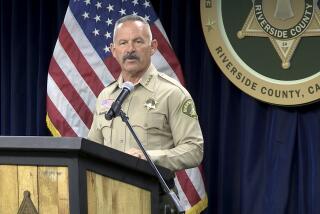Jackson’s Rhetoric About Shooting Raises Concerns
- Share via
RIVERSIDE — When the Rev. Jesse Jackson leads a march here Saturday to protest the police killing of a 19-year-old black woman in December, Mayor Ron Loveridge won’t be at City Hall to welcome it.
Loveridge says that he is weary of the civil rights activist’s fiery rhetoric about the shooting. Jackson has compared it to an execution, and he said race played a factor.
“Our police are not racist thugs, nor is our community a hotbed of racial intolerance,” said Loveridge.
Several black community leaders in Riverside say that they share Loveridge’s qualms about Jackson’s firebrand rhetoric. Nor has Riverside been the only city to voice apprehension in recent days over a visit by Jackson.
Black ministers in Jasper, Texas, said they pointedly asked Jackson to tone down his remarks when he arrived to offer comfort to the family of James Byrd Jr., the black man who was killed by a white supremacist when he was chained and dragged behind a truck.
Jackson is unapologetic about his comments on the shooting. But he added that some of his statements have been misinterpreted and are not intended to reflect on “people of goodwill” who live in places like Riverside and Jasper. At the same time, people like them, he said, “have a responsibility to uncover that which is rotten and violent.”
Jackson said Loveridge is “riding a very difficult situation. But he must know that people cannot take these kinds of acts of violence by the police in stride.”
Tyisha Miller was killed Dec. 28 when police were called to her parked car, where she was unresponsive and had a gun in her lap. Unable to rouse her and unsure whether she was in medical distress, an officer broke a window to grab for the gun. Police said she then reached for it and four officers, all of them white, opened fire, shooting about two dozen times and striking her 12 times, killing her instantly.
The shooting is being investigated by the Police Department, the Riverside County district attorney’s office and the FBI. The four officers are on paid leave.
Jackson has pulled few punches in characterizing the shooting death.
* At UC Riverside on Feb. 16, Jackson said the killing was “at best . . . excessive force. At worst, it was coldblooded murder.”
* Jackson told reporters last Saturday that Miller’s death was similar to or worse than the lynching of a 14-year-old boy in Mississippi in 1955 because Miller was shot by “a death squad of policemen.”
* And on last Sunday’s CNN television show “Both Sides With Jesse Jackson,” the onetime presidential candidate specifically cited the Miller shooting when telling his guest, a white supremacist, that “you ought . . . to be against that kind of violent race hatred.”
Loveridge calls Riverside “a good and decent community” and says he resents that it has now become “a rhetorical stage.”
Riverside--founded by a crusading abolitionist--was among the first cities in the country to integrate its elementary schools, and was the first in California to name a high school after Martin Luther King Jr.--in a predominantly white neighborhood, no less.
A privately financed statue of King will be unveiled April 3 alongside City Hall; Riverside was named one of 10 “All America” cities in a nationwide competition in 1998.
Some Riverside black leaders applaud Jackson’s passionate stumping, while others say they tolerate it because they embrace his overall message. But some--including several who would not speak for attribution--are critical.
Rose Mayes, who heads the city’s Human Relations Commission and led the charge to erect the King statue, said Jackson has mischaracterized Riverside.
“I’m not saying Riverside is perfect, but I’m disappointed by his comments,” she said. “I think he’s turning quite a few people off. . . . It’s not reflective of this community.
“It’s not ever good . . . when people come in, inciting other folks in the community, saying what they say and then moving on,” she said.
Norm Martin, chairman of the Urban League of Riverside and San Bernardino Counties, said he is not generally bothered by Jackson’s remarks. But Martin said he wonders how Jackson could conclude that Miller’s death was the result of “violent race hatred.”
“We don’t know the facts yet . . . so to say the police officers fired that many times because she was black, we don’t know that,” Martin said.
The Rev. Shermella Egson, who became pastor of the Allen Chapel African Methodist Episcopal Church in Riverside after serving 18 years as a Los Angeles police officer, said she understood why Loveridge was upset by Jackson’s remarks. “But the fact is, there is racism in Riverside and maybe too long we’ve been ignoring that fact.”
Black leaders in Jasper said they were worried that Jackson would unnecessarily stir already pitched emotions when he came to their town, so they advised him to take a softer tack.
“People are on edge because of this [murder] and we were worried he might say the wrong thing,” said the Rev. Kenneth Lyons, the Jasper victim’s family’s pastor.
Community leaders say Jackson took their advice to heart and focused his remarks on healing, not anger.
In the Riverside case, Jackson said in a telephone interview Thursday that community leaders are overreacting to his remarks.
“I didn’t accuse Riverside of being a hotbed, but many citizens there feel that way,” he said. He doesn’t know if Miller’s shooting resulted from race hatred, he said, “because I cannot check [the police officers’] hearts.” But, he said, “race was a factor” and any killing is the manifestation of hate.
Her death, he said, was “totally inhumane and unnecessary. At some point, let’s call it what it was, an execution . . . state terrorism.”
Jackson said that just as Selma served as a backdrop to civil rights advances, the shooting of Miller--as well as other recent police shootings across the nation--”could be a defining moment in America coming to grips with the overpowering zealotry of all police, who overkill.”
“It’s not about black or white, it’s about wrong and right,” he said.
Loveridge, who had attended a fund-raising dinner for Miller’s family last week where Jackson was the featured guest, said he will not march Saturday, nor open up City Hall to greet Jackson.
“At the dinner,” Loveridge said, “he mentioned he would be giving me a phone call, but I’ve had no contact. I’d like to tell him, we are not a Selma of the 1960s.”
More to Read
Sign up for Essential California
The most important California stories and recommendations in your inbox every morning.
You may occasionally receive promotional content from the Los Angeles Times.













